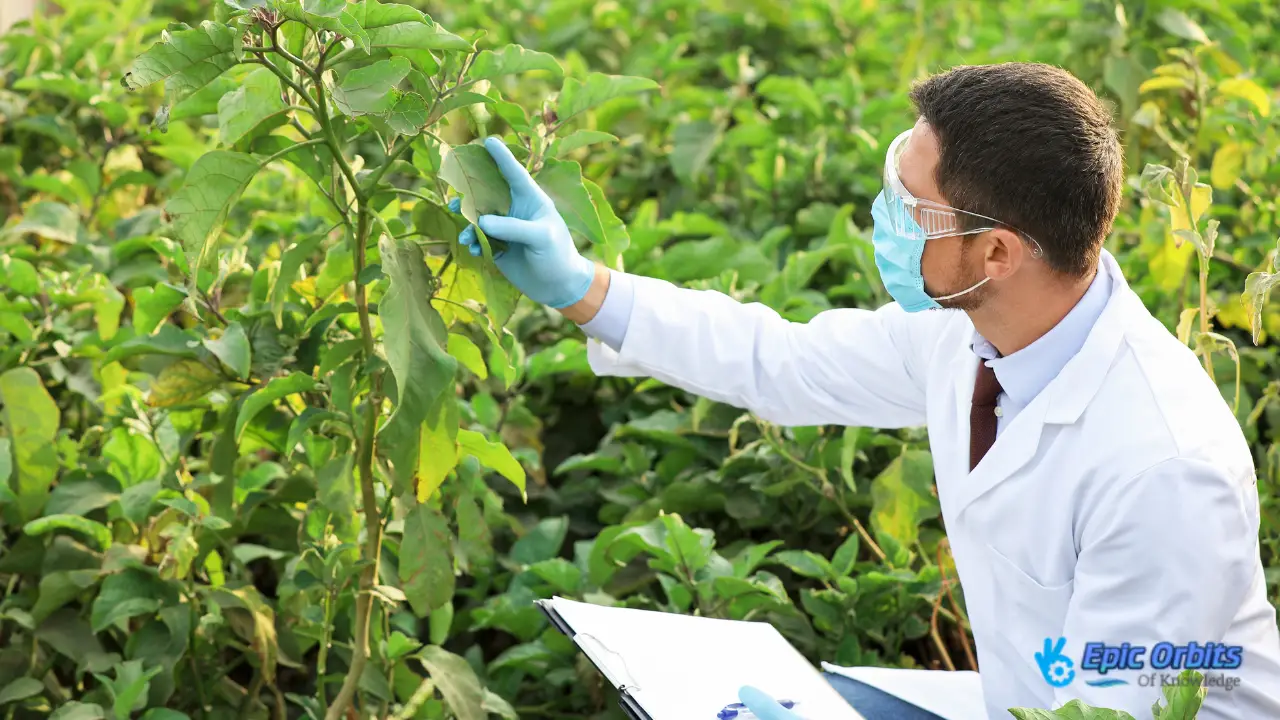Biotechnology in Agriculture Sustainable Farming Solutions
Biotechnology in agriculture enhances crop yield, resistance, and sustainability through genetic engineering, biofertilizers, and pest control

In agriculture, biotechnology brings agricultural productivity, resilience, and sustainability by means of genetic modification, biofertilizers, and pest-resistant plants. It also improves food security, lessens environmental impact, and promotes sustainable agriculture practices.
Crop output has not increased much during the previous twenty years. Simultaneously, climate change has caused us to lose a significant quantity of land. Global nutrition is seriously challenged since the population is expected to reach 9.7 billion by 2025. Biotechnology in agriculture might be the solution, allowing us to generate food in a way that helps the environment.
Farmers may produce more food, use fewer pesticides, and maintain healthy soil by means of biotechnology. This maintains the safety of our surroundings and guarantees plenty of food for everyone. Already, well over 5 million Indian farmers are using innovative agricultural techniques, combining biotechnology with natural surroundings.
Rows of vibrant crops and large silos far away define a rich, gorgeous agricultural setting. Nestled within an array of advanced biotechnology instruments, a white-lab-coated scientist examines a substance beneath a high-powered microscope in front. Warm, golden light blankets the area, suggesting development and inventiveness. In the center ground, robotic harvesters deftly traverse the fields, effectively compiling the abundant crop. The overall atmosphere reflects a blend of scientific inquiry, technology integration, and environmentally friendly farming methods that work together to feed the planet.
Knowing Biotechnology in Agriculture: The Guide for a Modern Farmer
Farmer biotechnology has evolved significantly. It enables producers to breed better cattle and increase more crops. Farmers may produce better crops using genetic engineering that need fewer pesticides.
It produces crops resistant to diseases and pests as well. The fact that farmers lose less food implies that everyone has more to consume.
Biotechnology also increases agricultural efficiency. Some crops, for instance, may flourish even in rather dry or hot conditions. For farmers who can now cultivate crops in areas they were unable to in years past, the outcome is fantastic.
Agricultural biotechnology enhances farming by means of genetic engineering and other techniques under influence. It alters the genes of crops, therefore improving their quality. In this sense, researchers may enhance crops with desirable qualities.
Long ago, old agricultural methods were prevalent. But biotechnology has provided fresh approaches to farming. It enables farmers to produce more sustainable and superior harvests.
It also facilitates more people having food and improves the surroundings for farming. Thanks for biotechnology’s developments here.
In biotechnology for agriculture, many individuals are crucial. Policymakers, scientists, and farmers all take part. Together, they ensure that biotechnology serves everyone and is used properly.
Agricultural Biotechnology: How Biotech Changing Fields
Biotechnology-mediated crop enhancement is transforming agriculture. It helps farmers produce more food, use fewer pesticides, and maintain soil’s health. New biotech techniques are developed to address environmental and dietary issues. For instance, gene editing hastens the development of plants. Addit Additionally, genetically altered cover crops like pennycress help save money and improve soil quality.
Key advantages of biotechnology in agriculture consist of:
- higher quality and crop yields.
- Biotechnology also contributes to a reduction in environmental impact and the use of pesticides.
- improved fertility and soil quality.
- Biotechnology has enhanced water conservation and resilience to droughts.
Another product of biotechnology is heat-resistant livestock. This enables cattle farming to cope with environmental change. Engineered soil bacteria can even eliminate nitrogen, therefore lowering the need for synthetic fertilizers. As the world’s population grows, biotechnology will be essential for both environmental preservation and food for everybody.
The Food and Agriculture Organization (FAO) estimates that 820 million people are undernourished worldwide; so, improved agricultural biotechnology seeks to solve the problem by means of food security.
Farmers are using biotechnology differently. It guarantees everyone has enough to eat, reduces environmental damage, and increases food output. We’ll find more biotech solutions as research improves. These will provide environmentally friendly and profitable farming.
Agricultural biotechnology: fundamental tools and approaches
Agricultural biotechnology reduces pesticide usage and increases crop yields by utilizing many technologies and approaches. Thanks to bioengineering, genetically altered crops able to flourish under difficult circumstances are now available. It has also produced foods high in nutrition, such as rice loaded with vitamins.
Important techniques include gene editing, tissue culture, and molecular breeding. These methods let scientists change a crop’s DNA to incorporate traits like disease resistance or drought tolerance.
In agriculture, biotechnology has many benefits. It increases agricultural outputs, lowers pesticide usage, and makes food safer. The International Service for the Acquisition of Agri-biotech Applications (ISAAA) reports that the area planted with biotech crops has increased significantly. Biotechnology crops will span around 190 million hectares by 2021.
- Perfect modification of the genetic code is made possible by gene editing and CRISPR technologies.
- Single-cell tissue culture techniques facilitate the regrowth of plants from individual cells.
- Desirable features, such as disease resistance or drought tolerance, may be introduced thanks to molecular breeding methods.
These instruments and approaches have revolutionized the field of agricultural biotechnology. They support the development of crops fit for a world of increasing population. We will see more fresh applications of bioengineering in agriculture and genetic modification in farming as science continues developing.
Supercharging Crops: Modern Agricultural Genetic Engineering
Genetic engineering is changing the way we grow crops. With transgenic crops leading the way, farming is becoming more efficient. Up to a 50% increase in agricultural yields is possible by altering a protein in such an improvement.
Such an improvement is important, as typically soybeans and wheat squander 20% to 50% of their energy. This happens because the plants prefer oxygen over carbon dioxide, which negatively impacts the recycling. In the context of agriculture, genetic engineering provides numerous benefits.
IC engineering provides numerous benefits. Consider:
- Field studies show improvements of 27% to 47% in crop yields.
- Fewer pesticides should be used, as genetically modified crops are more resistant to illnesses and pests.
- More efficient water usage and improved root systems of genetically modified crops could potentially enhance soil health.
Stephen Long and his colleagues believe crop output might rise by half. Working to generate 50% more rice and wheat, the C4 Rice Consortium is also looking for less fertilizer and water.
Given the global population is expected to reach 9 billion by 2025, genetic engineering is very vital. For everyone to eat, it is quite vital.
Ecological Agriculture Made Possible by Biotechnology Solutions
Biotechnology is helping to propel sustainable agriculture. Harmful chemicals like insecticides are less needed thanks in part to this technology. It does this by producing crops immune to illnesses and pests.
Important advantages of biotechnology in agriculture consist of:
- Genetic modifications have produced crops like tomatoes and corn that are immune to pests, therefore lowering chemical inputs. This preserves crops and reduces the need for pesticides.
- Biotechnology has enabled crops to flourish with less water by means of bettering techniques. We also use less water for agricultural purposes.
- Thus, new biotechnology methods have made plants more stress-resistant, thereby improving the state of Globally, genetically modified crops currently occupy nearly forty million hectares of land.
ly forty million hectares of land. North America comprises most of this. This study demonstrates how biotechnology is lessening our need for dangerous chemicals.
Using biostimulants has reduced fertilizer use by 25%. This is preserving the same degree of fertilizer efficiency. Losses without crop protection might be as high as 83%.
Modern agricultural biotechnology offers several benefits. Reduced chemical inputs can be achieved through genetic modifications for insect resistance, minimizing the need for pesticides. Water conservation strategies help improve crop yields by optimizing irrigation and plant efficiency. Soil health enhancement is supported by biotechnological techniques for stress-responsive traits, promoting sustainable and productive farming practices.
Disassembling the advantages: Lab to table
Agricultural biotechnology has transformed food production and cultivation. It applies genetic engineering and gene editing, among other methods. This approach reduces pesticide usage while still helping farmers produce more food.
The process provides healthier food and benefits the surroundings. Moreover, it is more sustainable.
Key advantages of biotechnology in agriculture consist of:
- Biotechnology enables farmers to produce more food with fewer resources. Therefore, it requires less land and water.
- By helping crops become pest-resistant, genetic engineering helps reduce pesticide use. By using fewer chemical pesticides, the surroundings gain from this.
- Improved nutrition: Biotechnology may provide crops with vital elements. This promotes public health as well as improving our cuisine.
Biotechnology in agriculture will become even more important as the global population increases. It guarantees our sufficient supply of food and guides sustainable behavior. Biotechnology will help us to create a more environmentally friendly, productive, and efficient food system.
Biotechnology provides multiple benefits in agriculture. It supports improved crop yields, allowing farmers to produce more food with fewer resources. It helps reduce pesticide use by introducing pest-resistant traits through genetic engineering. Additionally, biotechnology can enhance nutrition by fortifying crops with essential nutrients, improving their overall nutritional value.
Methodologies of Implementation for Biotechnology Agriculture
Beginning biotech farming calls for meticulous preparation and validation. It can enable more people to eat by making crops flourish. We have to consider, however, the tools and knowledge required to make it feasible.
A few crucial factors to give thought to are
- We should evaluate the existing farming methods and strive to enhance them.
- Intend to include tech and novel biotech crops.
- We aim to impart new knowledge to both specialists and farmers.
Better methods of food production may result from biotechnology used in farming. However, we must address the constraints and challenges associated with biotechnology. Knowing how to start biotech farming will enable us to contribute to improving the security and quality of our food chain.
The adoption of biotech crops has shown measurable impacts on agricultural productivity. Maize exhibits a 1.6% yield increase with an 80% adoption rate. Rice shows a 1.0% yield increase and a 60% adoption rate, while wheat has a 0.9% yield increase with 50% of farmers adopting biotech varieties.
Overcoming obstacles in agricultural biotechnology
Genetic modification in farming and other agricultural technologies can transform our food production. Still, the profession deals with challenges like complicated regulations and public uncertainty. By allowing farming to be greener and more efficient, biotech crops may benefit
Important obstacles in agricultural biotechnology consist of
- Approval of genetically modified organisms may take a lot of time and is difficult.
- Public opinion: Many question the advantages and safety of genetically altered foods.
- High development expenses: Small businesses find it difficult, as the cost of generating biotech crops is enormous.
Notwithstanding these challenges, agricultural biotechnology’s business is quickly growing. By 2031 it should reach $64.7 billion. To inspire invention, big brands like Bayer CropScience and Syngenta AG are funding research. Better agricultural techniques result from the use of genetic modification and biotech crops to solve these issues.
Agricultural biotechnology’s future is bright. It may address major concerns like social and economic inequalities, environmental damage, and food security. New, creative ideas and technologies, such as precise gene editing and CRISPR, will emerge as the sector expands.
Agricultural biotechnology faces several challenges. Regulatory barriers can be addressed through streamlined approval processes. Public perception issues may be mitigated by education and awareness campaigns to inform people about the benefits and safety of biotech crops. High development costs can be overcome through increased investment in research and development.
Future Directions: Agri-Biotech’s Next Step
Agricultural biotechnology has promising futures. Fresh ideas and technology are arriving. Rising at 8.3% yearly, the worldwide market is expected to reach $119.6 billion by 2028.
Investigated are gene editing and CRISPR. They could battle infections and increase agricultural output. These developments aim to address the projected seventy percent increase in global food consumption by 2050.
The sector will veer toward sustainability. It will stress improved soil quality and reduce pesticide usage. The development of genetically altered crops aimed at addressing these problems is in progress.
Agricultural biotechnology’s investment is rising. Leading firms include Monsanto and Syngenta. 60% of crops are created for pest resistance; genetically modified organisms are proliferating.
The agricultural biotechnology market was valued at $74.6 billion in 2022, with an annual growth rate of 8.3%. By 2028, the market is projected to reach $119.6 billion, maintaining the same 8.3% growth rate, reflecting steady expansion and adoption in the sector.
Actual Case Studies: Biotechnology in Agriculture in Action
Agricultural biotechnology has produced several success stories. A major component of this is genetic modification used in agriculture. Tissue culture bananas, for instance, have increased crop output and reduced pesticide usage in Kenya.
Statistics show that a single shoot can produce up to 2,000 plantlets within six months. 340 days after they were planted, TCB bananas are ready for picking. The process speeds up 80 days compared to conventional plants.
Farmer Emmanuel worked 7.3 hectares of land. He planted up five hectares for Bt cowpea. From 2-3 bags per hectare of conventional beans, his production amounted to 13. This case illustrates how biotechnology can enhance farming practices and boost crop yields. Biotechnology farming offers numerous advantages.
g offers numerous advantages. These include improved disease resistance, fewer pesticide usages, increased agricultural yields, and better soil quality. These benefits result from agricultural use of genetic engineering. It now shapes our agricultural practices and growth.
Biotechnology can significantly improve crop productivity. For bananas, the growing cycle is reduced from 420 days with traditional methods to 340 days using biotech techniques. In cowpea, yields increase dramatically from 2–3 bags per hectare with conventional farming to 136 bags per hectare when biotech methods are applied.
These success stories highlight how biotechnology may improve agricultural conditions. The increasing use of genetic engineering in agriculture will provide more innovative solutions to agricultural problems.
Conclusion
The biotechnology revolution is significantly transforming agriculture. It offers fresh answers for the main problems facing our food chain. Precision farming and gene-edited crops able to withstand difficult conditions are among the developments we see.
Venture money totaling more than $1 billion has entered agritech since 2020. This suggests that the sector is ready for rapid growth. Among the topics under much discussion are gene editing, artificial intelligence in agriculture, and blockchain for supply networks. Catching up on rules will result in improved agriculture, environmental care, and clearer food pathways.
We can guarantee food for everyone by embracing agricultural biotechnology developments and sustainable agriculture methods. Farmers, leaders, and creatives should come together now. Let’s improve our food systems by means of this biotech revolution.



